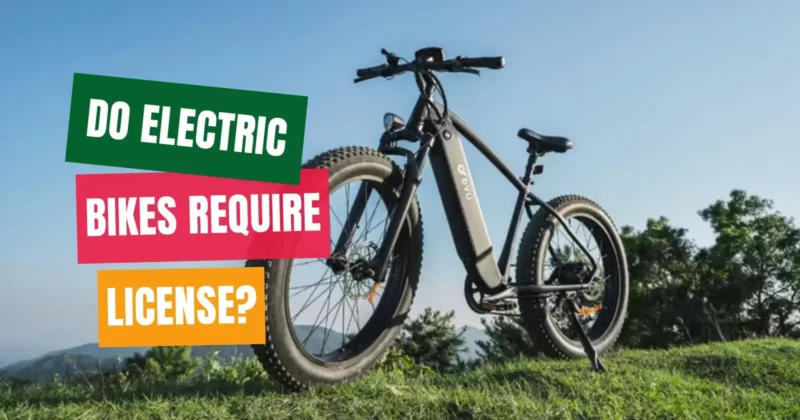Do Electric Bikes Require License?

 The Short Answer is: The Short Answer is: |
The answer to this question varies depending on the specific regulations in different regions or countries. In general, most jurisdictions consider low-speed electric bikes that meet certain criteria, such as limited motor power and maximum speed, to be categorized as regular bicycles rather than motor vehicles. Therefore, they may not require a license for operation. |
Electric bikes, also known as e-bikes, offer a modern and eco-friendly form of transportation that has been steadily gaining popularity in recent years.
Combining the convenience of a bicycle with the added power of an electric motor, these vehicles have become a favorite choice for individuals seeking an efficient way to commute or explore their surroundings.
With concerns about climate change and the need for sustainable mobility options on the rise, more people are turning to electric bikes as an alternative to traditional cars or motorcycles.
These innovative modes of transportation not only reduce carbon emissions but also provide health benefits by encouraging physical activity and reducing traffic congestion.
However, amidst all the buzz surrounding electric bikes, there is one burning question that potential riders may have: Do electric bikes require license?
Understanding whether licensure is necessary can affect one’s decision to purchase an e-bike and navigate regulations associated with its usage.
In this article, we will explore this topic in order to shed light on licensing requirements for electric bike enthusiasts while exploring the exciting world of pedal-assisted rides. So buckle up (or should we say pedal along?), because it’s time to hit the road!
Table of Contents
Differentiating between types of electric bikes
Electric bikes come in different classes, each with its own set of regulations and motor assistance levels. Understanding these distinctions is crucial when determining whether a license is required to operate them.
Class 1 electric bikes are equipped with a pedal-assist system that provides motor assistance only when the rider is actively pedaling.
The maximum speed for Class 1 electric bikes typically ranges from 20 to 28 miles per hour (32 to 45 kilometers per hour). These bikes do not require a license to operate in most jurisdictions.
Class 2 electric bikes, on the other hand, have both throttle and pedal-assist systems. This means riders can achieve motor assistance without actively pedaling.
However, like Class 1 electric bikes, they also have limited top speeds ranging from around 20 to 28 miles per hour (32 to 45 kilometers per hour), depending on local regulations.
Finally, there are Class 3 electric bikes which offer higher levels of motor assistance compared to the previous two classes. They usually have maximum speeds ranging from approximately 28 to 38 miles per hour (45-61 kilometers per hour).
In many regions, obtaining a driver’s license or specific permits may be required due to their increased speed capabilities.
Understanding these classifications and associated speed limits helps potential riders decide which type of electric bike best suits their needs while also providing clarity regarding licensing requirements based on local regulations.
Understanding local legislation
Researching local laws pertaining precisely to licensing requirements for operating different classes of e-bikes and discussing how these regulations might vary from one jurisdiction to another.
When it comes to determining whether or not electric bikes require a license, the answer largely depends on your location. Each country, state, or province has its own set of rules and regulations regarding the operation and licensing of electric bikes.
Thus, familiarizing yourself with the specific legislation in your area is crucial in understanding if you need a license to ride an electric bike legally. In some jurisdictions, electric bikes that meet certain criteria are classified as bicycles rather than motor vehicles.
As a result, they may be exempt from requiring a driver’s license or registration. These criteria often revolve around factors such as top speed limits (often 20-28 mph), motor power output (usually limited between 250-750 watts), and pedal-assisted functionality.
However, it’s important to note that even within these criteria, there can still be variations among locations that impact whether or not a license is required.
To ensure compliance with local laws for electric bike usage within your community or region, it is recommended to refer directly to municipal bylaws and consult government transportation departments or relevant websites for up-to-date information on licensing requirements specifically related to e-bikes.
By researching local legislation thoroughly before purchasing an electric bike and hopping onto the saddle enthusiastically without worrying about legal hindrances later!
Age Restrictions for Electric Bike Licensing
When it comes to licensing electric bikes, age restrictions can vary depending on the country and type of electric bike being operated. In most cases, non-licensed electric bikes have less stringent age requirements compared to licensed ones.
For example, in many countries, children as young as 14 or 16 years old can legally operate non-licensed electric bikes without a license. However, for more powerful electric bikes that require a license or are considered motor vehicles, the minimum age requirement is usually higher.
In these cases, individuals may need to be at least 18 years old or possess a valid driver’s license to ride and operate such vehicles legally. It’s important to note that while there are general guidelines regarding age restrictions for operating electric bikes worldwide, specific exceptions or special cases exist.
Some countries may have their own unique regulations concerning the minimum age requirements for both licensed and non-licensed types of electric bikes.
Therefore, it is crucial for individuals to research and familiarize themselves with the local laws governing their particular region before riding an electric bike. By doing so, they can ensure compliance with any specific age-related legalities in place.
Remember that understanding the minimum age requirements associated with operating different types of electric bikes will not only keep you informed but also help prevent any potential legal issues down the road.
Liability concerns
When it comes to electric bikes and licensing, there are some important liability considerations to keep in mind. While the requirements for licensing may vary depending on the country or state you reside in, bypassing these regulations when necessary can lead to potential liabilities.
One significant factor to consider is public safety. Electric bikes have become increasingly popular modes of transportation, but they still pose risks, especially if operated at high speeds or without proper training.
Licensing ensures that riders have a basic understanding of road rules and safety precautions, reducing the chances of accidents and injuries. Additionally, adhering to licensing requirements could also impact your insurance coverage.
In many regions, riding an unlicensed electric bike may void any insurance policies you have in place. This means that if you were involved in an accident while operating an unlicensed vehicle, you might be personally responsible for all damages or injuries incurred.
It’s crucial to prioritize public safety by abiding by relevant licensing regulations and obtaining appropriate insurance coverage when using an electric bike.
By doing so, not only do you protect yourself legally but also ensure the well-being of those around you while enjoying this convenient form of transportation.
Navigating legal gray areas
As the popularity of electric bikes continues to soar, so does the need for clear and consistent regulations surrounding their usage. However, in many jurisdictions, there remain certain ambiguities and loopholes when it comes to licensing requirements for electric bikes.
While some countries have specific laws in place regarding electric bike licenses, others find themselves caught in a legal gray area. In some regions, the distinction between an electric bicycle and a motor vehicle can be blurred.
This creates challenges when it comes to determining whether a license is required or not. The classification of an electric bike often depends on factors such as its maximum speed or power output.
For example, in certain places, if an electric bicycle exceeds a certain speed limit (usually around 20-28 mph), it may be considered a motorized vehicle that requires licensing – such as registration plates or driver’s licenses.
It’s important for individuals who are considering purchasing an electric bike to familiarize themselves with the local laws and regulations governing these vehicles’ operation.
Consulting official government websites or speaking with local authorities can help clarify any uncertainties about licensing requirements specific to your region.
Clearing up these legal gray areas ensures that riders are well-informed and compliant with all necessary rules while enjoying the benefits of riding their electric bicycles safely on public roads.
Conclusion on Do Electric Bikes Require License
While the need for a license to operate an electric bike depends on various factors, such as the classification of the bike and local regulations, it is important to stay informed about specific requirements in your area.
In countries like the United States, Canada, and Australia, certain classes of electric bikes may not require a license or registration if they meet specific criteria regarding speed and power output.
For instance, in the US, low-speed electric bicycles with pedal-assist capabilities that don’t exceed 20 mph are typically treated similarly to traditional bicycles and do not require a license. In contrast, some European countries have stricter regulations regarding licensing for electric bikes.
In countries like Germany and France, riders may need some form of license or registration depending on factors such as motor power output or maximum assisted speed. It is important to note that these requirements can vary significantly from country to country within Europe.
Ultimately, before purchasing an electric bike or planning any long-distance rides in your region or abroad, it is crucial to consult with local authorities or transportation departments to understand the specific laws pertaining to licensing requirements.
By staying informed about relevant regulations concerning licenses for electric bikes in your jurisdiction before hitting those scenic trails or urban streets with your new ride; you can ensure both legality and peace of mind during your electrifying adventures!
